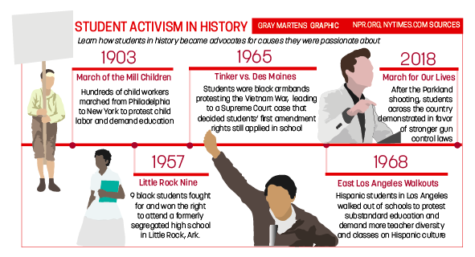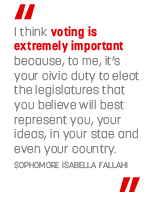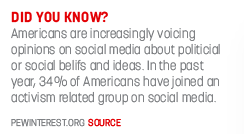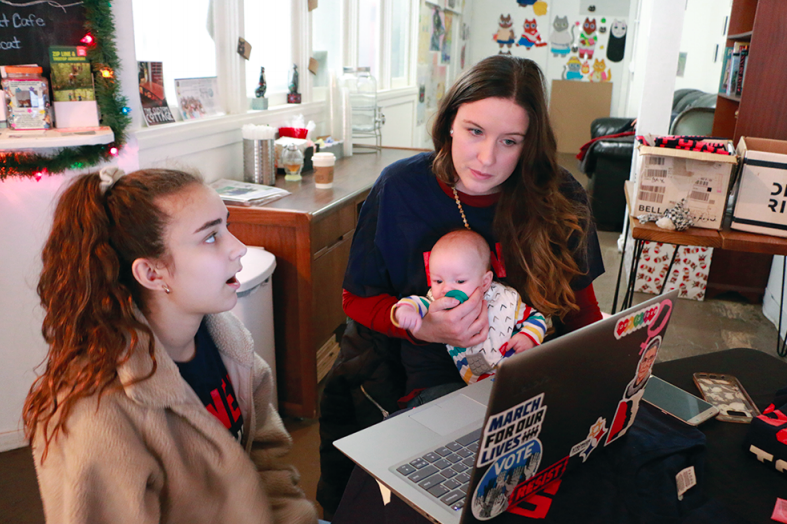For sophomore Isabella Fallahi, the months leading up to the midterm elections this past November consisted of waking up, getting ready, going to school, then catching a ride to the Hamilton County Democratic Office, where she would pick up a shift manning phones or canvassing in neighborhoods around Hamilton County. Her everyday life was fairly routine, revolving around politics. At 15, she was already familiar with what it meant to be on the campaign trail, working tirelessly to connect with people whose votes would determine the success of months of effort.
“I put so much on the back burner for this midterm election,” Fallahi said, “I would go out and canvas no matter what, rain or shine. I actually got a cold because of it. I’d be at the campaign office until 5-7 (p.m.), and on some days I wouldn’t finish my homework until late at night.” Fallahi said.
Fallahi is just one of the increasing number of young people who have been actively involved in the American political system. Movements like the March for Our Lives (MFOL), which survivors of the shooting at Marjory Stoneman Douglas High School created to advocate for gun control and reform, and Stand for the Second, a national movement supporting limited gun control reform founded by students in response to the walkout held by MFOL, have sprung up across the country, prompting many young people like Fallahi to become more engaged in politics both locally and nationally.

Voter turnout and registration remains one of the main focuses of these movements, especially in regards to young people, as people under the age of 29 have surpassed the so-called Baby Boomers as the largest generation alive today, according to the Pew Research Center. However, historically young people have always had some of the lowest voter turnouts in the country. In 2014, for example, only 26 percent of people under age 40 voted in the midterm elections.
U.S. government teacher Mickey O’Toole said young people tend to have lower voter turnouts for various reasons. He said, throughout history, young people are typically more informed than most people give them credit for, but a lot of it comes out to priorities. At 18, you’re still figuring things out, you’ve never voted before, and things that are different can cause us some anxiety to begin with. Voting is also not at the forefront, as it’s the first election they’re voting in, so most people don’t start paying attention until about that point, so they don’t feel informed enough.”
Groups like CHS Action Together, a nonpartisan club focused on increasing political awareness, are trying to change that. CHS Action Together conducted its first voter registration drive during the second semester of the 2018 school year for upperclassmen who would be eligible to vote in the 2018 midterms. On National Voter Registration Day, which took place on Sept. 25, over 800,000 young people were registered to vote.
For Fallahi, registering people to vote was, and continues to be, part of her everyday activities. Fallahi has a link to register online almost permanently copied on her phone, and she said she still keeps it in the notes of her phone. While canvassing, she said she always had voter registration forms tucked into the back of her clipboard, which was covered in campaign stickers for Democrat candidates.
Fallahi said, “I think voting is extremely important because, to me, it’s your civic duty to elect the legislators that you believe will best represent you, your ideas, in your state and even your country, because that’s your life that’s on the line, especially with a lot of the current policy. If you don’t vote, how do you expect anything to get done? To me, it’s exercising your civic duty in order to ensure the proper checks and balances that define this country.”

While many activists believed that there would be what was dubbed a “blue wave” in which democrats overwhelmingly won seats, the primary concern for people like Fallahi was not who young people voted for, but that they voted at all. According to a Tufts University study, 31 percent of people ages 18-29 voted in the 2018 midterms, a 12 percent increase from the 2016 presidential election (NPR).
“I think it’s really unfortunate that more young people didn’t get out and vote but it’s also a significant increase from what we’ve seen in previous years,” Fallahi said. “I think that, as each year goes on local community organizers and organizations as a whole as well as parents should be really working to get their children to take part and have more civic engagement and I feel like it’s going to take quite a bit of time to get that up to 100 percent, but for now, even though 31 percent may seem small or insignificant, but it’s quite the increase.”
Like Fallahi, Young Republicans Club president and sophomore Chris Elmore worked after school almost every day making calls and knocking on doors for the Republican party. Before the midterm elections, Elmore said, “I think you’re going to see a little bit of a spike, but I don’t think it’s going to be that much. I don’t think it’s going to be enough to push Democrats over the edge for the midterm elections. I think it’s great that young people are getting involved, and if they can get out and vote that’s fantastic, but given the data from the past, and given the low turnout rates from young voters in almost every single election, I don’t really see that changing with this midterm election.” Like Fallahi, Elmore worked after school almost every day making calls and knocking on doors for the Republican party.

Now, activist groups across the country are working to continue the energy that built up over the course of 2018. Both Elmore and Fallahi still go to work after school, though now their jobs are mainly answering phone calls and manning the front desk. Elmore still runs the Young Republicans Club, and Fallahi continues to form a Latinx Student Union and a CHS branch of one of the anti-gun violence organizations she works with.
As for whether or not the momentum built up around midterms will hold up, especially in the 2020 presidential race, both Elmore and Fallahi said they think so, and they plan to continue making their voices heard, and standing up for the causes they’re passionate about.
Older people especially are concerned that young people will not continue to show up in the numbers that they did during the 2018 midterms. Older people especially are concerned that young people will not continue to be active in their communities.
According to O’Toole, to maintain current political energy levels, people have to keep participating in the political process.
O’Toole said, “People tend to feel that voting is their only civic duty. There’s contacting legislators, there’s you yourself getting involved in a cause, staying active after all the passion. The voting should be the culmination of all of the things you’ve done up to that point.”

Fallahi said she plans to continue doing just that. She is the president of Women’s March Youth Empowerment Indiana and helped plan the Women’s March, which took place on Jan 19. She attended meetings, planned fundraisers, organized groups of people, and spoke while looking out at the tens of thousands of like minded people, both young and old, who are striving to make a change in their communities, their country, and their world.
“I believe everyone should become politically involved for the sole purpose that you learn more about the people in this country, their hardships and successes. And it provides you with vital information and skills for changing your community and helping make it a better place for everyone.” Fallahi said.

































![What happened to theater etiquette? [opinion]](https://hilite.org/wp-content/uploads/2025/04/Entertainment-Perspective-Cover-1200x471.jpg)













































![Review: “The Immortal Soul Salvage Yard:” A criminally underrated poetry collection [MUSE]](https://hilite.org/wp-content/uploads/2025/03/71cju6TvqmL._AC_UF10001000_QL80_.jpg)
![Review: "Dog Man" is Unapologetically Chaotic [MUSE]](https://hilite.org/wp-content/uploads/2025/03/dogman-1200x700.jpg)
![Review: "Ne Zha 2": The WeChat family reunion I didn’t know I needed [MUSE]](https://hilite.org/wp-content/uploads/2025/03/unnamed-4.png)
![Review in Print: Maripaz Villar brings a delightfully unique style to the world of WEBTOON [MUSE]](https://hilite.org/wp-content/uploads/2023/12/maripazcover-1200x960.jpg)
![Review: “The Sword of Kaigen” is a masterpiece [MUSE]](https://hilite.org/wp-content/uploads/2023/11/Screenshot-2023-11-26-201051.png)
![Review: Gateron Oil Kings, great linear switches, okay price [MUSE]](https://hilite.org/wp-content/uploads/2023/11/Screenshot-2023-11-26-200553.png)
![Review: “A Haunting in Venice” is a significant improvement from other Agatha Christie adaptations [MUSE]](https://hilite.org/wp-content/uploads/2023/11/e7ee2938a6d422669771bce6d8088521.jpg)
![Review: A Thanksgiving story from elementary school, still just as interesting [MUSE]](https://hilite.org/wp-content/uploads/2023/11/Screenshot-2023-11-26-195514-987x1200.png)
![Review: "When I Fly Towards You", cute, uplifting youth drama [MUSE]](https://hilite.org/wp-content/uploads/2023/09/When-I-Fly-Towards-You-Chinese-drama.png)
![Postcards from Muse: Hawaii Travel Diary [MUSE]](https://hilite.org/wp-content/uploads/2023/09/My-project-1-1200x1200.jpg)
![Review: "Ladybug & Cat Noir: The Movie," departure from original show [MUSE]](https://hilite.org/wp-content/uploads/2023/09/Ladybug__Cat_Noir_-_The_Movie_poster.jpg)
![Review in Print: "Hidden Love" is the cute, uplifting drama everyone needs [MUSE]](https://hilite.org/wp-content/uploads/2023/09/hiddenlovecover-e1693597208225-1030x1200.png)
![Review in Print: "Heartstopper" is the heartwarming queer romance we all need [MUSE]](https://hilite.org/wp-content/uploads/2023/08/museheartstoppercover-1200x654.png)



